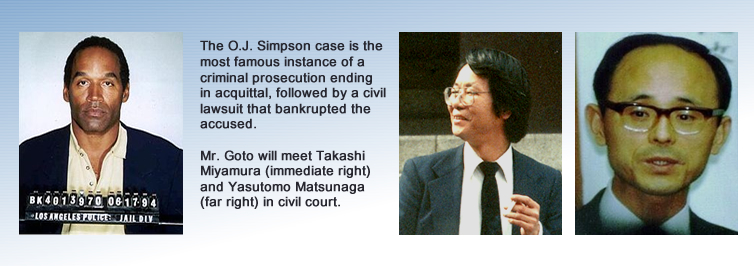![]()
The Words of the Das Gracas Family
|
|
The Words of the Das Gracas Family |

Mr. Toru Goto, a well-known victim of kidnapping and de-conversion, filed civil suit in Tokyo District Court demanding damage compensation of 200 million Yen ($2.4 Million) against deprogrammers Takashi Miyamura and Yasutomo Matsunaga, on Feb 3, 2011, according to Human Rights Violations in Japan, an Australian blog.
humanrightslink.blogspot.com/2011/02/goto-takes-deprogrammers-to-court.html).
Mr. Goto was confined for 12 years and five months (Sep. 11, 1995 -- Feb. 10, 2008) against his will in an attempt to abandon his faith.
The Tokyo Prosecutors Office declined to indict the deprogrammers in December of 2009, citing insufficient evidence as the reason. The Tokyo No 4 Committee for the Inquest of Prosecution decided on Oct 6, 2010 that the Prosecutor's Non-Indictment decision was appropriate. This ended the chance of criminal trial.
Mr. Goto is now seeking a civil trial.
"The civil suit by Mr. Goto is a major test case for the Japanese judicial system," said Mr. Dan Fefferman, the president of International Coalition for Religious Freedom. "It is a shame that Japan's criminal justice system failed to uphold his rights and punish the crimes perpetrated against him. However, a strong ruling in Mr. Goto's favor in the civil courts will at least partly redeem this miscarriage of justice."
In the United States, civil cases sometimes result in major victories for plaintiffs even after criminal trials end in acquittals.
In the case of Jason Scott, an 18-year-old Pentecostal believer who filed criminal charges in 1993 against deprogrammer Rick Ross, the criminal trial ended in acquittal. But in the civil case (1995), Scott was awarded almost $5 million in damage compensation and punitive compensation from deprogrammer Rick Ross, his assistants and the Cult Awareness Network (CAN), which put CAN out of business. Scott was eighteen years old at the time of the abduction and thus legally an adult. CAN was a co-defendant because a CAN contact person had referred Scott's mother to Rick Ross. In the trial, Jason Scott was represented by Kendrick Moxon, a prominent Scientologist attorney.
The nine-member jury unanimously held the defendants liable for conspiracy to deprive Scott of his civil rights and religious liberties. In addition, the jury held that Ross and his associates (but not CAN) "intentionally or recklessly acted in a way so outrageous in character and so extreme in degree as to go beyond all possible bounds of decency and to be regarded as atrocious and utterly intolerable in a civilized community." The case resulted in an award of $875,000 in compensatory damages and punitive damages in the amount of $1,000,000 against CAN, $2,500,000 against Ross, and $250,000 against each of Ross's two accomplices. The case bankrupted the Cult Awareness Network and marked a watershed for new religious movements in North America.
The O. J. Simpson case is perhaps the most well known instance of a civil lawsuit that gained victory after a criminal prosecution had failed. The O. J. Simpson murder case (officially called the People v. Simpson) was a criminal trial held in Los Angeles County, California Superior Court from January 29 to October 3, 1995, in which former American football star and actor O. J. Simpson was tried on two counts of murder following the June 1994 deaths of his ex-wife Nicole Brown Simpson and her friend Ronald Goldman. The case has been described as the most publicized criminal trial in American history. Simpson was acquitted after a lengthy trial that lasted over nine months -- the longest jury trial in California history.
Later, both the Brown and Goldman families sued Simpson for damages in a civil trial. On February 5, 1997, a jury unanimously found there was a preponderance of evidence to hold Simpson liable for damages in the wrongful death of Goldman and battery of Brown. On February 21, 2008, a Los Angeles court upheld a renewal of the civil judgment against him.